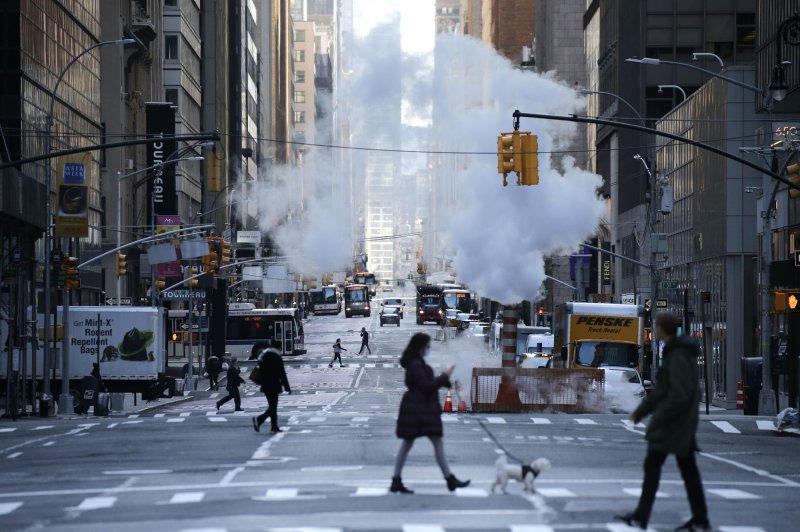The Centers for Disease Control and Prevention urged residents of New York, New Jersey and Connecticut to avoid non-essential travel to prevent the spread of the coronavirus as U.S. deaths doubled to more than 2,000. Photo by John Angelillo/UPI |
License Photo
March 29 (UPI) -- The Centers for Disease Control and Prevention urged residents of New York, New Jersey and Connecticut to avoid non-essential travel to prevent the spread of the coronavirus.
The CDC issued the Domestic Travel Advisory discouraging travel out of the three areas that have become hotspots in the global COVID-19 pandemic for 14 days, excluding employees of critical infrastructure such as trucking, public health professionals, financial services and food supply.
The United States leads all nations with 124,763 confirmed cases of COVID-19 and 2,192 deaths according to figures by Johns Hopkins University as of Sunday morning. The three states make up about half of the cases and deaths in the United States, as New York accounts for 52,318 cases and 728 deaths, New Jersey has 11,124 cases and 140 death and Connecticut has reported 1,524 cases and 33 deaths, according to a CNN tally.
The CDC advisory came at President Donald Trump's direction after he had considered a quarantine of the area.
"On the recommendation of the White House Coronavirus Task Force and upon consultation with the governors of New York, New Jersey and Connecticut, I have asked the [CDC] to issue a strong travel advisory, to be administered by the governors in consultation with the federal government. A quarantine will not be necessary," Trump wrote on Twitter.
Director of the National Institute of Allergy and Infectious Diseases Anthony Fauci told CNN's State of the Union on Sunday that Trump decided to issue the travel advisory instead of imposing a very strict quarantine on the three states after discussions with officials.
"We made it clear and he agreed, it would be much better to do what's called a strong advisory. The reason for that is you don't want to get to the point that you're enforcing things that would create a bigger difficulty, morale and otherwise when you could probably accomplish the same goal," he said.
About 215 million Americans have been placed under some sort of stay at home or shelter in place restrictions as of Saturday and is set to increase to 225 million by Monday as more areas encourage people to avoid leaving their homes for non-essential activities to prevent the spread of the virus.
The Florida Highway Patrol is installing check points at the state border to keep visitors from coronavirus "hot spots" from crossing the state line, including New York, Connecticut and Jersey as well as Louisiana.
On Monday Gov. Ron DeSantis signed an order requiring visitors from New York area to self-isolate on arrival for 14 days.
Rhode Island Gov. Gina Raimondo on Saturday night repealed an executive order mandating that all New Yorkers self-quarantine for 14 days. Police officers were to start pulling over cars and knocking on doors to track down visitors. Instead, "any person coming to Rhode Island, according to the order.
Gov. Andrew Cuomo called the original "unconstitutional" and a "reactionary policy" he was willing to sue over.
House Speaker Nancy Pelosi on Sunday acknowledged Cuomo's criticism that a $2 trillion coronavirus relief bill signed by Trump on Friday was "irresponsible" in its failure to meet the state's needs in response to the crisis, describing the bill as "a down payment" that must be fortified with additional legislation.
"We have to pass another bill that goes to meeting the need more substantially than we have," she told State of the Union. "We have other issues that we have to deal with in the bill in terms of personal protective equipment and OSHA rules that protect workers. We have more to do on family medical leave. We have to be able to make people who get tested also have their visit to the doctor covered."
Pelosi also stated that Trump denied the seriousness of the virus and delayed getting proper equipment where it was needed at the onset of the outbreak, which cost American lives.
"The other day, when he was signing the bill, he said, 'Just think, 20 days ago, everything was great,'" she said. "No, everything wasn't great. We had nearly 500 cases and 17 deaths already and in that 20 days, because we weren't prepared, we now have 2,000 deaths and 100,000 cases."















